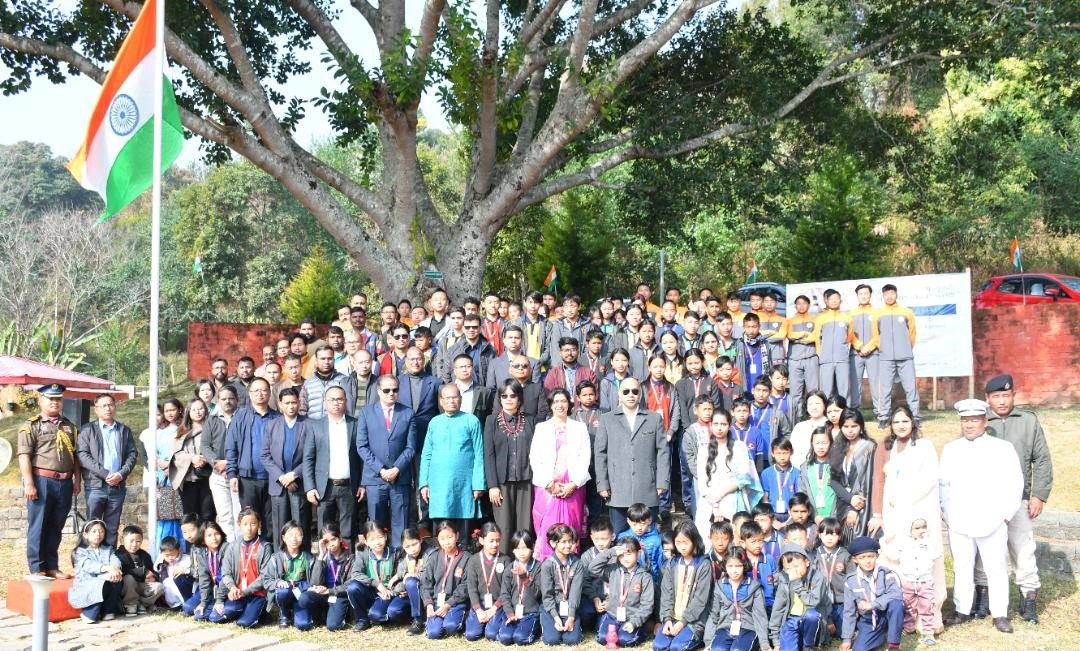Nagaland University commemorated India’s 76th Republic Day on 26th January 2025 at its Headquarters Lumami with Prof. Jagadish Kumar Patnaik, Vice-Chancellor of Nagaland University as the Chief Guest. The hoisting of the National Flag by Chief Guest was followed by the singing of the National Anthem. The programme, attended by the University fraternity, was chaired by Peter Ki, PRO and vote of thanks was proposed by Dr. Rumi Dhar, Asst. Professor, Dept of Law, informed a press release from the University.
In his speech, Prof. Jagadish Kumar Patnaik reflected on the country’s civilizational journey confronting multiple challenges, and yet not just surviving but flourishing. As a Republic, India’s head of state and government are elected by the people, and we are fully sovereign internally and externally, he said. Although the modern concept of democracy traces its roots to the Western world, India in fact is the mother of democracy as evident in our ancient village republics where consent and unanimity are the essence. For the past 76 years, our democratic institutions have flourished because the people of the country have decided for themselves, he added.
India is on the march to becoming the third largest economy in the world, and has been resolving her problems through democratic means and consensus without use of force. The power of the gun only succeeds in the temporary diffusion of problems, but a permanent solution comes through consensus. He stated that the northeastern states have prospered over the last 76 years, and though they may be lagging behind other states, they definitely are not backward because economic prosperity is a race. Compared to what was ten years ago, the northeastern states are today quite peaceful.
In all of these, the Constitution of India which came into effect in 1950 continues to play a pivotal role. He asserted that India’s constitution is a federal one where every small community has its own rights and autonomy to run its affairs. The constitution has not only given us democracy, autonomy, freedom, and adult suffrage but it has also ensured economic rights, education, life, the right to know, etc
Talking of Nagaland University, Prof. Patnaik highlighted a few significant ones from among the various steps taken during the last two years. From having a fourth campus run in rented buildings, the University today runs its affairs fully on its own in three campuses. Four more new departments are also in the pipeline; the new departments consisting of civil engineering, mechanical engineering, physical education, and vocational studies are very relevant for the state of Nagaland, he said. He wanted these four departments to undertake undergraduate programmes, progressing to post-graduate programmes, and then research programmes, with the ultimate goal of having a full-fledged under-graduate and post-graduate residential university. He also shared that twenty buildings have already been sanctioned to accommodate the students, and the university may also get a building from the Ministry of Women and Child Development.
Download Nagaland Tribune app on Google Play

He pointed out that the academic ecosystem too has improved. In this academic session, the four-year undergraduate programme shall be introduced, and students shall be admitted on the basis of CUET. This will begin with basic sciences initially. Given the manner in which each department is developing, he hoped that by the end of his tenure Nagaland University would have become part of the top 100 in the NIRF.
Prof. Patnaik said that education is the only means through which a society can develop. Whether it is higher education, primary education, secondary education, technical education, vocational studies, or skill-based education, all of them constitute the keys for development, which will then lead to prosperity. He pointed out that Nagaland is blessed with resources, which if utilized properly can help the state transform into a mini-Switzerland. The state has suitable climate, land resources, minerals, and a university that aims to have every form of knowledge and technology required to develop these resources. He went on to assert that our students can benefit by staying back in Nagaland, thereby reversing the current refrain that our students have low salary structures because they don’t venture out of the state. A time will come, he added, when our students will invest in entrepreneurship, start-ups, businesses, and then hire people from outside the state. Our future is bright, so long as we continue to work hard with dedication, sincerity, and honesty, he pointed out.
He ended by exhorting all to possess national character, in terms of readiness to sacrifice comfort zones for the growth of society and the nation. A developed Nagaland will lead to developed Bharat. He asserted that regionalism and nationalism are not contradictory but complementary because, to him, regionalism will always help in the growth of nationalism.

